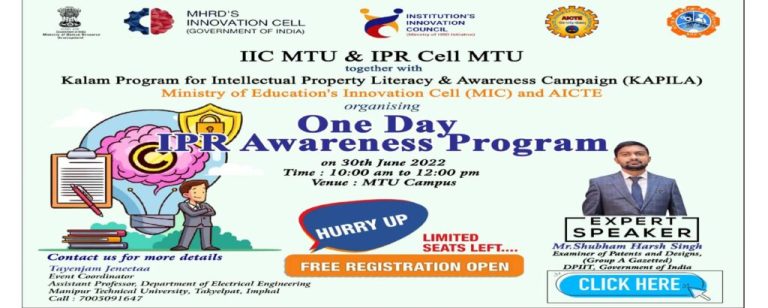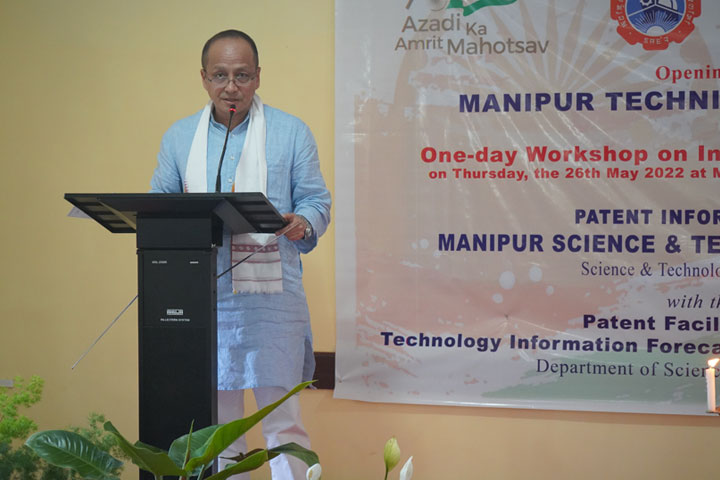The Intellectual Property Rights (IPR) Cell of Manipur Technical University was officially established on the 26th of May 2022 to promote innovation and research culture on the campus, faculty, and students-led start-ups and ventures and help them to protect and respect intellectual property. The cell aims to nurture the spirit of innovation and translate the innovation into value-added products, processes, and services for society and study the market feasibility and explore the commercial viability of the same. The cell is also committed to helping the common people in society by supporting them to shape their innovative ideas and guiding them to obtain the IP right. The IPR policy of the University aims to contribute to transforming industry and society by delivering research-driven education, promoting innovation, and collaboration, and fostering human values.
Objectives
- To advise and guide the students and faculty on the importance of IPR.
- To encourage faculty members to carry out patentable research.
- To promote an IPR culture compatible with the educational mission of the institute.
- To guide and advise researchers on how to obtain and sustain patents and help them approach the patent information centre (PIC).
| Sl.No. | Name & Designation | Role |
| 1 | H. Gyan Prakash, Hon’ble Vice Chancellor | Chairperson |
| 2 | Er. Kosygin Leishangthem, Assistant Professor, Department of Civil Engineering | Nodal Officer |
| 3 | Tayenjam Jeneetaa Assistant Professor, Department of Electrical Engineering | IPR Activity Coordinator (IIC Representative) |
| 4 | All Hod’s | Departmental Representative |
- Orientation Program
- Awareness Creation
- Hands-on Training
- Lectures on various issues of IPR
- IP clinic in which students can be asked to express innovative ideas
- Quiz Programs
- Innovation Workshop
Till now, Manipur Technical University’s Intellectual Property Rights (IPR) cell have organized many IPR awareness programs in association with the National Intellectual Property Awareness Mission (NIPAM), Office of the Controller General of Patents, Design & Trademarks, Ministry of Commerce and Industry, Department for Promotion of Industry and Internal Trade; Manipur Science & Technology Council (MASTEC) with support from Technology Information Forecasting and Assessment Council (TIFAC), an autonomous body under Department of Science And Technology and Kalam Program for Intellectual Property Literacy and Awareness Campaign (KAPILA), Ministry of Education’s Innovation Cell (MIC) and AICTE.
What is a patent?
A Patent is a statutory right for an invention granted for a limited period to the patentee by the Government, in exchange for full disclosure of his invention for excluding others, from making, using, selling, or importing the patented product or process for producing that product for those purposes without his consent.
Does Indian Patent give protection worldwide?
Patent protection is a territorial right and therefore it is effective only within the territory of India. However, applying in India enables the applicant to file a corresponding application for the same invention in convention countries, within or before the expiry of twelve months from the filing date in India. Therefore, separate patents should be obtained in each country where the applicant requires protection of his invention in those countries. There is no patent valid worldwide.
Is it possible to file an international application under Patent Cooperation Treaty (PCT) in India?
It is possible to file an international application known as a PCT application in India in the Patent Offices located in Kolkata, Chennai, Mumbai and Delhi. All these offices act as Receiving Office (RO) for International applications. The addresses of these offices are available on the website of CGPDTM i.e. www.ipindia.nic.in.
What can be patented?
An invention relating either to a product or process that is new involves inventive steps and is capable of industrial application and can be patented. However, it must not fall into the categories of inventions that are non-patentable under sections 3 and 4 of the Act.
Who can apply for a patent?
A patent application can be filed either by the true and first inventor or his assignee, either alone or jointly with any other person. However, the legal representative of any deceased person can also make an application for a patent.
How can I apply for a patent?
A patent application can be filed with Indian Patent Office either with complete specification or with provisional specification along with a fee as prescribed in schedule I. In case the application is filed with provisional specification, then one has to file complete specification within 12 months from the date of filing of the application. There is no extension of time to file complete specifications after the expiry of said period.
Is there a provision fo filling patnet applications electronically by an online system?
From 20th July 2007, the Indian Patent Office put in place an online filing system for patent applications. More information for filing online applications is available on the website of the Patent Office i.e. www.ipindia.nic.in. This facility is also available for filing trademarks application.
What are the criteria of patentability?
An invention to become patentable subject matter must meet the following criteria –
i) It should be novel.
ii) It should have inventive step or it must be non-obvious.
iii) It should be capable of Industrial application.
iv) It should not fall within the provisions of sections-3 and 4 of the Patents Act 1970.
http://www.ipindia.nic.in/writereaddata/Portal/IPOAct/1_31_1_patent-act-1970-11march2015.pdf
Should patent applications be filed before or after he publication of the details of the invention?
The patent application should be filed before the publication of the invention and till then it should not be disclosed or published. Disclosure of invention by publication before filing of the patent application may be detrimental to the novelty of the invention as it may no longer be considered novel due to such publication. However, under certain conditions, there is a grace period of 12 months for applying even after publication.
Important Websites:
| Sl.no. | Website | Link |
| 1 | Intellectual Property Office, India | Click Here |
| 2 | Patent office, India | Click Here |
| 3 | Copyright Office, India | Click Here |
| 4 | Automated Recordation & Targeting for IPR Protection | Click Here |
| 5 | E-Commerce portal of Central Board of Excise and Customs | Click Here |
| 6 | Intellectual Property Appellate Board, India | Click Here |
| 7 | Department of Information Technology, India Semiconductor Integrated Circuits Layout-Design Registry (SICLDR) | Click Here |
| 8 | Plant Varieties and Farmers’ Rights Authority, India | Click Here |
| 9 | National Biodiversity Authority | Click Here |
| 10 | The Indian IPR Foundation | Click Here |
| 11 | World Intellectual Property Organisation | Click Here |
| 12 | World Trade Organisation | Click Here |
| 13 | UK Intellectual Property Office | Click Here |
| 14 | European Patent Office | Click Here |
| 15 | The United States Patent and Trademark Office | Click Here |
| 16 | Attorney Office (Private, India) | Click Here |
IPR Cell MTU
Structural Engineering Lab
Department of Civil Engineering
Manipur Technical University
Takyelpat, Imphal, Manipur (India)

- By: Web Admin
- Date: March 5, 2024
One-Day Lecture Programme: New & Emerging Technologies Including AI/Machine Learning
- 3 min read
- 0 comment

- By: University
- Date: December 20, 2023
Observance of World Intellectual Property Day
- 2 min read
- 0 comment

- By: Contact
- Date: June 30, 2022
One-Day IPR Awareness Program
- 2 min read
- 0 comment

- By: Contact
- Date: May 27, 2022
Opening of IPR Cell-MTU & workshop on Intellectual Property Rights (IPR) with the support of Patent Information Centre (PIC) of Manipur Science & Technology Council (MASTEC)
- 2 min read
- 0 comment
